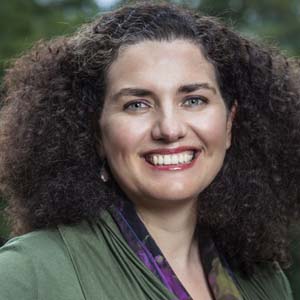
I consider myself incredibly lucky – I travel across New England visiting high schools, middle schools and even elementary schools, presenting for and meeting with thousands of amazing students each year. My job? Talking about eating disorders – what they are, what the warning signs are, what to do if someone suspects a friend or loved one may have one, and perhaps most importantly, ways to help avoid avoid developing one.
Sure, it’s tough stuff. Eating disorders are serious, impacting millions of school-aged youth across America. Like any mental health condition, they warrant honest and sometimes uncomfortable conversations. But these discussions help – I’m continually surprised at how engaged, aware, and empowered students can become in the span of a class period or two.
When I first meet with school administrators or teachers to plan a prevention program, I’m sometimes met with skepticism and worry. I don’t blame them, though – we’re talking about mental health within a school setting -I am concerned about the very same things.
So let me address some of these concerns:
“Will having a program on eating disorders awareness cause our students harm?”
Regardless of the size or age of the audience, here are the most important harms I aim to avoid:
- Providing incorrect information
- Exposing the audience to graphic images of extreme body sizes (this can be triggering for some individuals and is always avoided)
- Forgetting to carry a message of hope – that recovery from an eating disorder is absolutely possible
- Perpetuating the belief that Anorexia Nervosa is the only/most common/most dangerous eating disorder by not speaking enough about other disorders. Not discussing other types of eating disorders – Binge Eating Disorder, Bulimia Nervosa and others – helps maintains the intense stigma associated with those disorders, which prevents many individuals from seeking help in the first place.
- Reminding them of the (many) resources for help and support around them
- Not answering questions, regardless of how difficult they may be.
“If we talk about it, they’ll want to do it! We don’t want to provide a how-to course!”
One of the biggest misconceptions about eating disorders prevention programs is that a discussion about eating disorders will cause an increase in eating disorder behavior.
No, we don’t want to provide a “how-to” course, but most teachers would tell you that avoiding a topic doesn’t decrease interest or curiosity. This is true for any number of subjects in health education for adolescents.
Answering the questions they have in an age-appropriate way is the best way to direct the information they get. If I can give them correct information about what eating disorders look like and how they can be potentially prevented, then the curious student has some valid information to offset any misinformation they might gain from their friends, social networks or the media.
In my view, the biggest harm any of us can do in regards to eating disorders is staying silent when we see things that concern us:
- Weight-based teasing/bullying
- The promotion of the values of perfection, competition and success at any cost in our culture
- Under-representation of diversity in body size, shape, color, gender and sexual orientation in our communities
- The perpetuation of gender inequality and beauty as currency
- Sexual harassment going unchallenged
- Eating disorders not being seen or treated as a health issue
All these elements (and many more) contribute to a climate that is conducive to the development of disordered eating patterns.
Responsible, well-designed eating disorders prevention education is unlikely to cause harm to your students or trigger an eating disorder. One thing I do hear about, though, is an increase in one particular behavior: Students being better able to talk about eating disorders and reach out for help and support when needed. One school at a time, we are making a huge difference.
We know finding eating disorder treatment can be tough. Walden is here for you. If you are concerned that you, or a loved one, may have an eating disorder, please reach out by completing the form on this page or email us at intake_coordinators@waldenbehavioralcare.com.
 Stephanie Haines, M.Ed., CHES, is the prevention education specialist at Walden Center for Education and Research. Her role is to provide prevention education to school communities including students, teachers and administrators regarding eating disorders, body image and related topics. Before joining Walden, Stephanie was a senior health educator and prevention specialist at the nonprofit organization Freedom from Chemical Dependency (FCD) Educational Services in Newton, where she provided education to students in 50 countries about the prevention of alcohol, tobacco and drug abuse. Earlier in her career, she was a licensed occupational therapist in the Newport, N.H., school district. Stephanie earned her master’s degree from Plymouth State University in New Hampshire, where she served as a graduate assistant to Margaret Burckes-Miller, founder and director of the university’s Eating Disorders Institute. She earned her bachelor’s degree from Granite State College and an associate’s degree from New Hampshire Technical College.
Stephanie Haines, M.Ed., CHES, is the prevention education specialist at Walden Center for Education and Research. Her role is to provide prevention education to school communities including students, teachers and administrators regarding eating disorders, body image and related topics. Before joining Walden, Stephanie was a senior health educator and prevention specialist at the nonprofit organization Freedom from Chemical Dependency (FCD) Educational Services in Newton, where she provided education to students in 50 countries about the prevention of alcohol, tobacco and drug abuse. Earlier in her career, she was a licensed occupational therapist in the Newport, N.H., school district. Stephanie earned her master’s degree from Plymouth State University in New Hampshire, where she served as a graduate assistant to Margaret Burckes-Miller, founder and director of the university’s Eating Disorders Institute. She earned her bachelor’s degree from Granite State College and an associate’s degree from New Hampshire Technical College.






